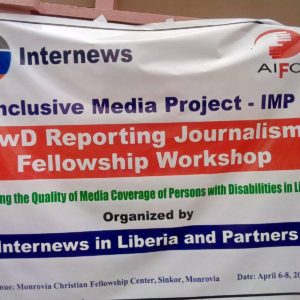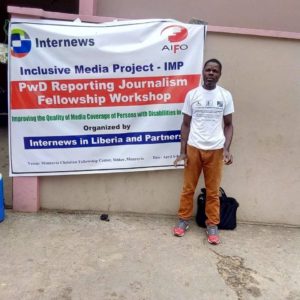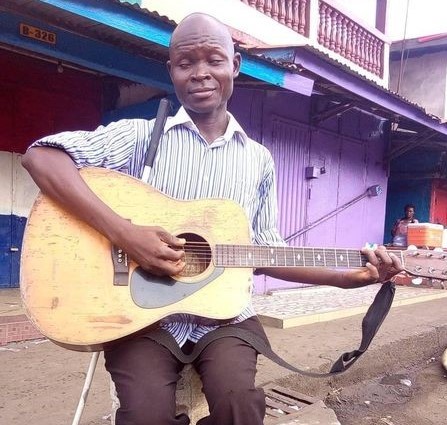PHOTO: Blind (Visually Impaired) Henry Kpadeh surviving on his musical talent
By Samuel G. Dweh—freelance development journalist—+231 (+231) 886618906/776583266/samuelosophy@yahoo.com, samuelosophy1@mail.com
THE GENERALIZED PERCEPTION IN THE LIBERIAN SOCIETY
In Liberia, when you are disabled—visually impaired (blind) or move in wheelchair or with crutches (or move on your knees because you don’t have wheelchair)—majority of the non-disabled people feel you can’t make any impactful contribution to the development of the Country. On your survival, the same people (the majority) feel only “begging” is appropriate for you—because you “can’t work” (their perception)
This “feeling” is expressed in Government’s failure on a ‘national welfare program’ for citizens living with disabilities; it is expressed in employer’s continued procrastination on promised interview of a disabled jobseekers in a group of applicants or unwarranted dismissal of only the disabled employee in a workforce; it is expressed in builder’s omission of Ram (smooth pathway) from the architectural plan for a “public building” (to be used by PWDs); and it is expressed in a non-disabled person’s throw of money to the disabled person when the PWD’s visit isn’t to “beg” for money.
THRASHING THE “NEGATIVE PERCEPTION” OF THE (MAJORITY)
Many Liberia’s persons living with disabilities are challenging this stereotype being clinched to by majority of their compatriots and some of the foreigners residing in the Country.
The “Champions” are many, but I will mention few of them considering limited newspaper space for this article.
My first “winner” is visually impaired Mr. Henry Kpadeh (his photo is featured in this article) who supports his five-member family (including his wife) with his musical talents. He’s involved into what he calls “Public Entertainment”, especially at Government Ministries and Agencies. While waiting for working hour for these places, Mr. Kpadeh sits at streets’ intersections or bus parks and entertains traders around him and passers-by, melodiously striking the cords of his guitar accompanied by a sonorous voice. During his entertainment session on Saturday, March 6, 2021 at Benson & Johnson Streets’ junction, Monrovia, the visually impaired musician said to this writer in a brief chat: “Instead of surviving through street-begging, I prefer using my talent of music to survive and to support my family.”
The second “Champion” is Madam Christine Mamey Vanjah (visually impaired) who bakes various kinds of cakes for different occasions. During the in-door program of the 2020’s White Cane Day celebration (14th and 15th of October), Madam Christine M. Vanjah charged at her visually impaired colleagues: “We, blind people, should use other parts of our body to get our needs and wants, instead of always begging on the street or complaining to the Government. I’m using my hands to bake various kinds of bread and I’m making wedding cakes on the knowledge I acquired few years ago.”
At a two-day (16-17 February, 2021) International Labour Organization-supported Capacity-Building and Awareness Workshop on Decent Work Environment for people with disabilities in Liberia, organized by the Liberia Labour Congress and the Liberia Office of Italian Human Rights-promotion NGO, AIFO, Madam Vanjah showcased one of her culinary productions: Rice Bread.
The third “Champion” is Mr. David Hne Wallace (physically challenged—moves on crutches), Founder and Executive Director of the Bahcagwe National Transit for Persons with Disabilities, an agricultural and animal rearing company located in Central Virginia, Montserrado County. When this article was being patched (Monday, April 12, 2021), Mr. Wallace was working with hired building contractors constructing a Pig Pan for the Animal Husbandry unit of his farms. “Some members of Liberia’s disability community should take the lead in telling the community of abled-bodied people that the disabled person isn’t naturally condemned to surviving on alms from the non-disabled person,” Mr. Wallace had told me during a chat at the 2020’s White Cane Day celebration, in Grand Bassa County’s Capital, Buchanan. I was covering the celebration for the National Union of Organizations for the Disabled (NUOD), an independent Liberian advocacy group for PWDs.
The fourth, and last person for this article, disabled person living above non-disabled persons’ shared anti-PWD stereotype is Zeogar Ralley (physically challenged) In his wheelchair, he sells in-sachet water (cold) and sweets (candies and biscuits) to drivers and passengers of vehicles in the Tubman Boulevard between 14th and 16th Streets. During traffic hold-up, he rushes into the road; when the traffic loosens, he scurries out of the vehicular road to avoid being knocked down by a moving vehicle. The reserves of his commodities are often kept at a space in the St. Peter’s Lutheran School on 14th and 15th Streets in Sinkor. He had taken this writer at this “storage” during discussion about a television documentary on “economically self-reliant persons in Liberia’s Disability Community”, to be done by me.
LIBERIA UNLIKE OTHER COUNTRIES ON RESPECT FOR WELLBEING OF DISABLED CITIZENS
Majority of members of Liberia’s non-disabled people’s community do not feel the comfort or happiness of their compatriots with disabilities as a reflection of the entire Country’s comfort or happiness. Will a sane person say “my entire body is working fine” when one part of the body is experiencing excruciating pain? On their fellow countrymen/women living with disabilities, majority of non-disabled Liberian feel disability is a “normal thing”—because they are not experiencing the emotion-stinging inconvenience disabled people encounter from gaze, mockery and ostracism from non-disabled persons.
This is expressed through one of the ways stated earlier in this article. Example: A builder of a public building that ignores “accessibility part” (Ram) to the architectural plan of the building to be constructed.
Other African Countries are leading Liberia on demonstrating Human-Rights-based respect for citizens living with disabilities, even though each is bogged with some disability issues. This ‘leadership role’ can be seen in non-disabled citizens’ support to nation-building initiatives by their disabled compatriots.
One example: Individual Ghanaians supported the nurturing and maturing of musical talents of two biological brothers—twin(one named Tommy Wiredu) in Ghana when this writer was a refugee in the Country (from 1990) for 11 years (ended in 2001) The twin were two of Ghana’s biggest musical stars.
Another example: Individual non-disabled Nigerians helped on realization of a musical dream of their compatriot (Yinka Afelele) who moves with crutches or in a wheelchair. When this writer was in Nigeria (2001-2011) Mr. Yinka Afelele was one of Nigeria’s popular musician of High Life music—traditional (secular) and Christian gospel.
Due to the hypertension-inducing treatment of PWDs in Liberia, Norway-based Liberian wheelchair-mobile Christina Blessing Massaquoi, a mother of three children, living with the children’s father, isn’t thinking about returning to her ancestral home in the near future. She had confessed this to me during each of our chats via WhatsApp. Madam Massaquoi connected with me through my story about an 86-year-old Liberian Government’s pensioner who survives on garbage collection and disposal as a survival method while waiting for the release of his pension that had been trapped over six years. (Madam Massaquoi read the article on FrontPage Africa’s website in February, 2021) She told me that Polio during her infant stage caused her disability at age 12, and that she’s working on registering a not-for-profit NGO to run a mentoring session for PWDs on economic self-reliance when National Government isn’t supportive. Her dream is to relay the program to Liberia through Liberian television stations. Her mother, a Liberian, who was a Morning’s Preacher on Ghana’s refugee camp (in the 90’s) is working at a Norwegian Care Home for elderly disabled people.
Madam Massaquoi had said during one of our phone chats: “You may not believe this: My apartment in Norway is disability-sensitive. Each of the doors in the house opens, without being touched by anyone, when I appear in my wheelchair. And I use a remote control to bring down my water from the faucet in the bathroom. When I was in Liberia, the situation for me was the opposite to what I’m experiencing in Norway. In Norway, I’ve read several news stories about plight of people living with disabilities in Liberia, most of the stories about the recurrent plight of disabled people on food, homelessness, and issues with accessibility in public building. What this tells me, now away in another Country, is the Government of Liberia doesn’t care much for the wellbeing of people living with disabilities. With such reports, I can’t imagine myself coming home soon.”
THE INTERNEWS INTERVENTION (VIA A REPORTERS’ FELLOWSHIP PROGRAM)
The Internews, a media development project of the U.S. Government (working through the United States Agency for International Development—USAID), came to Liberia in 2015. The USAID-Liberian Project is titled Liberia Media Development (LMD) focusing much on empowering of Radio Stations on supply of equipment and training staff and reporters of partner-Stations. USAID also established Community Radio Stations in many of Liberia’s 15 Counties, especially in politically disadvantaged parts.
In recent time, beginning from February, 2020, Internews has been looking toward issues of people living with disabilities in Liberia, with special interest on how they are portrayed in journalistic works about them.
On February 4, 2021, Internews held its first disability-focused interactive session titled “High Level Media Roundtable Reporting on People Living with Disabilities (PwDs) in Liberia” The first sentence of the first paragraph of the Invitation Letter states: “Internews has embarked on the implementation of a new media project designed to boost the quantity and quality of coverage of persons with disabilities in Liberia”
The event was held in the Conference Hall of Shark’s Restaurant and Event Center near to the James Spriggs Paynes Airfield in Monrovia. The Liberian Government was present through the National Commission on Disabilities (NCD) Also in attendance were Internews’s non-governmental partners on its “new project”. They were: National Union of Organizations of the Disabled (NUOD) and Liberia’s Office of the Association Friends of Raoul Follereau (AIFO), and Italian organization, working with the Liberian Government and Liberia’s independent groups on disability since 1997.

INTERNEWS FELLOWSHIP ON “CHANGING THE NARRATIVE” ABOUT PERSONS WITH DISABILITIES
For three successive days (6-8 March, 2021 ) practicing Liberian Journalists—converged as ‘PWD Reporting Fellows’ at the Monrovia Christian Fellowship Center, 9th Street, Sinkor, Monrovia. Only one was a freelancer (the author of this article) and only one was visually impaired—Jeff Tarnue, Program Producer at ABC FM (105.1) in Monrovia.
The selection, preceded by application for the Fellowship, was based on each applicant’s demonstrated interest for reporting on the disability community, proven through published works (with links for the works online provided in request by Internews)
Day One of the Workshop was for introduction of partners, remarks by partners, a Training Overview, and Facilitators’ lectures on meaning of “disability” and disability issues around Africa—mostly in contravention of the United Nations Convention on the Rights of Persons with Disabilities (UNCRPD)—, available Local and International Frameworks on disability, and tips on Disability Reporting.
The main business of Day Two (March 7) began with “Language and Terminology of Disability Reporting” by Kenyan Journalist Jackie Ludibwe (working with Internews in Kenya) through virtual platform (Zeno) She said Journalists should always call each PWD by his or her proper names during interview, and should never refer to any PWD as “handicapped”, “deaf”, “invalid” or “mute”, from a list of do’s and don’ts of Disability Reporting on the Projector screen.
The next session, “Multi Media Skills”, was presented by Mr. Jeff Massah (radio journalist), Deputy Chief of Party (D-COP), USAID Liberia Media Development (LMD) Project. The subtopic was Elements of News Media—Text (writing), audio, graphs, etc.
The next session, “Interviewing PWDs”, was handled by Madam Jackie Lidubwe. Three of several tips she gave were do not lean on the wheelchair of a PWD (if the person is wheelchair-mobile), allow the person to choose the interview point he/she prefers, and do not overshadow the discussion (the interviewee should talk more)
Day Three had two physical Presenters—Mr. Dixon T. Pennie (physically challenged), Media Trainer at the Liberia Media Center (LMC) and Mr. Jeff Massah (Internew)
Mr. Pennie presented on “Developing Story Angles for Persons with Disabilities”, and started lectures with posing a question to the body of Fellows on each person’s knowledge of the definition of “angle”. Various definitions came from the Fellows. The Educator provided the correct answer: “Story angle refers to the side the reporter takes the story from.” He mentioned the PWD’s educational background or his/her profession—for the purpose of the “new narrative” as required by Internews.
Mr. Jeff Massah handled two topics: “Using Data to Cover Disability Stories” and “Leveraging Social Media to Report on PwDs”
At the end of each presentation session, the Fellows’ comprehension was tested through a Group Work/Session called for by the Facilitator.
On each of the Workshop days, the Internews PWD Reporting Journalism Fellows were mentally energized with sumptuous Breakfast and Lunch—Liberian and Western delicacies.
The next task for each Fellow? Think about a story idea on a member or a group of Liberia’s disability community, and do a narrative (via radio, television, or the newspaper) Internews will provide the funding!

About the Author:
Samuel G. Dweh—Liberian Writer, Author, and freelance development Journalist, member of the Press Union of Liberia (PUL), and member of the Liberia Association of Writers (LAW)—is an Internews Fellow of Reporting on People Living with Disabilities in Liberia. He has been writing about Liberia’s disability community since 2013—two years after he returned from a 10-year refugee life in Nigeria. He can be reached via: (+231) 886618906/776583266/samuelosophy@yahoo.com, samuelosophy1@mail.com

